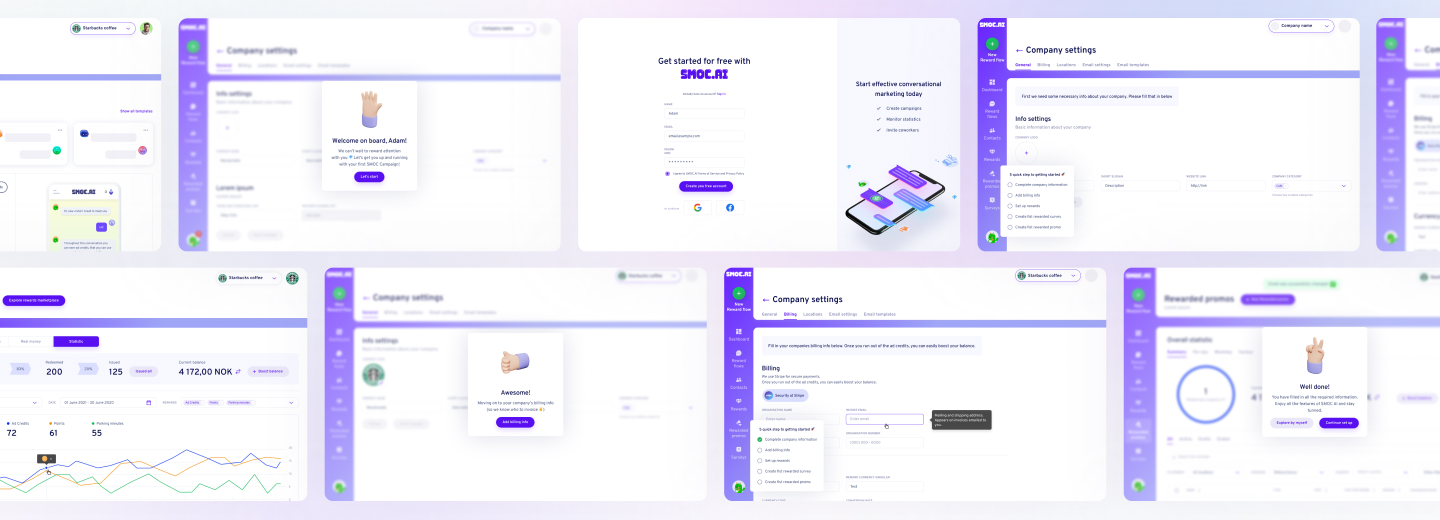Startups have to innovate and distinguish themselves in extraordinary ways to get noticed by their target audience and investors. With 2025 on the horizon, the digital marketing sphere is getting new opportunities as well as challenges for starting ventures.
This article discovers the best digital marketing strategies specifically tailored for early-stage startups. We will explore effective tactics to maximize brand visibility, engage target audiences, and drive sustainable growth. From leveraging social media platforms to implementing search engine optimization (SEO) techniques, we will provide actionable insights to help you with promotion online.
what’s in the article
- When Do Startups Need a Digital Marketing Strategy?
- Main Elements of a Startup Digital Marketing Plan
- Top Digital Marketing Strategies for Startups in 2025
- How much should a startup spend on digital marketing?
- Conclusion
When Do Startups Need a Digital Marketing Strategy?
In the early stages of development, startups must prioritize establishing their unique identity and connecting with their audience to achieve great benefits later. Without a doubt, an effective digital marketing strategy is a core necessity when launching products, entering new markets, and establishing long-term business goals. These strategic plans should be ready before market introduction, facilitating the maximum possible customer engagement.
This involves forming a comprehensive understanding of your target audience. By gathering and evaluating analytics, startups can craft timely campaigns that resonate emotionally and distinguish them from their competitors. Personalised digital marketing strategies equip startups with insights to optimize resources, measure growth, and catalyze market presence at any stage. This encompasses understanding your strengths, addressing weaknesses, and seizing opportunities when speaking to the audience.
Main Elements of a Startup Digital Marketing Plan
Crafting a robust digital marketing plan for startups in 2025 involves numerous steps, such as: defining a clear brand identity, understanding the consumer journey, and employing data-driven approaches to test, refine, and scale campaigns. Specific techniques to achieve tangible results include SEO optimization, omnichannel outreach, and real-time engagement, which are critical for capturing the dynamic attention of consumers.
Defining Marketing Goals
Any digital marketing campaign should start by setting thoughtful marketing goals which become the target point with which further strategies are aligned. Clearly defined direction fortifies teams and fuels ambitious pursuits toward a startup’s vision.
Marketing goals should be specific and measurable, based on the SMART criteria. This ensures each target brings actionable insights, enhancing the strategic framework instead of simply showing fancy numbers. Startup success is based on the clarity of goals that resonate not only with internal stakeholders but also with the targeted customer segments. When objectives are transparent and coherent, the performers will see manageable milestones instead of vague assumptions.
Identifying Target Audience
Identifying your target audience is one of the most important points in crafting effective digital marketing strategies for startups. Successfully identifying your audience enables personalized engagement, significantly boosting brand loyalty, web visibility and customer involvement.
- Conduct Market Research: Employ surveys, focus groups, and data analytics tools to gather insights about potential customers.
- Analyze Competitor Audiences: Study competitor strategies to understand who they serve and identify market gaps.
- Define Demographics and Psychographics: Specify age, location, interests, and behaviors to tailor content with precision.
- Assess Customer Needs and Pain Points: Find in the fields and prioritize solving real problems that potential customers face.
- Utilize Social Listening Tools: Monitor social channels to grasp audience sentiment and preferences without mediators.
Create a Content Strategy
Crafting an effective content strategy involves defining clear objectives and core messages deliberately planned for a specific audience. When selecting appropriate distribution channels, the content manager should ensure an agile presentation of the content according to a content calendar, and measure and adjust performance. By setting specific goals like brand awareness, lead generation, or customer engagement, and developing key messages that align with your brand values and resonate with your target audience, you can ensure your content is impactful.
In addition, it is rather important to select the location of your content properly. Choose platforms that best reach your audience, such as blogs, social media, or video content. Maintaining consistency through a well-planned content calendar allows you to deliver content regularly.
Finally, regularly analyzing performance metrics enables you to refine and optimize your strategy for maximum effectiveness. A well-defined strategy helps direct content efforts towards meaningful objectives and ensures alignment with overall business goals. Emphasizing creativity and consistency in your content can significantly enhance engagement and brand recognition in competitive markets.

Looking to Build an MVP without worries about strategy planning?
EVNE Developers is a dedicated software development team with a product mindset.
We’ll be happy to help you turn your idea into life and successfully monetize it.
Top Digital Marketing Strategies for Startups in 2025
In 2025, most marketing strategies will be created in such a way to empower startups to captivate audiences and maximize growth in smarter ways with refined approaches. Artificial intelligence, data analytics, and hyper-personalization will be on the edge, incorporated into traditional strategies and communication channels.
Content Strategy
A robust content strategy starts with an initial message tailored to resonate, inform, and inspire your target audience. You should create content that speaks directly to your audience in the right context. Developing a clear content strategy involves understanding emerging content technologies that allow combining ideas with the art of storytelling. Such a combination allows better results in engagement, interaction, and the exploration of fresh perspectives. It is often offered by online marketing startups that drive the niche.
Businesses get better messages by connecting on emotional levels with target audiences while leveraging technological advancements. The future of content lies in crafting engaging profiles based on immersive AR experiences or integrating interactive AI-driven content creation.
Collaboration with Other Startups
Teaming up with fellow startups can unlock remarkable opportunities for innovation and market expansion. By sharing tools, technologies, and expertise, startups can enhance efficiency and reduce costs if compared with any strives they can take alone.
Cross-promotion through each other’s digital platforms can reach broader audiences without losing their trust. Though it requires specific planning and selection of possible partners for this deal. Joint ventures allow startups to develop new products or services together, leveraging their combined strengths and sharing resources or experience if needed.
Hosting or attending collaborative workshops and webinars can also bring valuable partnerships. Such partnerships can drive growth, mitigate risks, and stimulate creative solutions for startup online marketing opportunities.
Email Marketing
Email marketing remains a cornerstone in digital marketing strategy for startups, offering a high return on investment, and nurturing meaningful customer relationships. Automation and data-driven insights enhance personalization and bring a better user experience and brand reliability. Personalized email experiences strategically evolve, elevating user engagement through finely-tuned content, timing, and segmentation, addressing a subscriber’s unique journey.
Predictive analytics will enable startups to anticipate customer needs with remarkable precision. Through AI-generated content and dynamic templates, emails can adapt to individual preferences, transforming simple messages into bespoke conversations.
Search Engine Optimization
Search Engine Optimization (SEO) continues to ensure strong online visibility, through content and technical perfection of web products. In 2025 SEO services for startups will transcend traditional methods, incorporating AI to streamline search algorithms or advanced search practices.
By applying machine learning, search engines will prioritize context over keyword frequency, enhancing natural search experiences and rendering complex information more accessible through specific blocks of content. Conversely, startups must develop an agile SEO strategy to overcome any hindrances and make content more accessible.
Numerous emerging technologies such as voice search and augmented reality will drive SEO techniques, requiring startups to adapt and incorporate them into their framework.
AI Marketing Tools
These advanced tools will empower startups by leveraging machine learning and data analytics to customize marketing campaigns. This level of personalization will enhance customer engagement and drive brand loyalty. Predictive analytics, powered by AI, will anticipate consumer behaviours, allowing startups to proactively tailor their strategies and particular campaigns. This insight not only optimizes marketing efforts but also maximizes resource allocation.
Moreover, AI-driven automation will streamline routine tasks, enabling startups to focus on strategic initiatives. Tools like chatbots and CRM systems will enhance customer service and improve sales conversions with minimal human intervention.
Website Accessibility Audit
Website accessibility has emerged as a game-changer in digital marketing strategies for a startup. A comprehensive accessibility audit is an opportunity to grab this trend and create an open environment. These audits are invaluable for upholding social responsibility, enhancing user experience, and expanding market reach.
Startups, through specialized audits and techniques, can identify and eliminate barriers, guaranteeing that everyone enjoys seamless access. Such audits include assessing website compliance to international standards like Web Content Accessibility Guidelines, in terms of whether all content is perceivable, operable, and understandable.

Proving the Concept for FinTech Startup with a Smart Algorithm for Detecting Subscriptions

Scaling from Prototype into a User-Friendly and Conversational Marketing Platform
How much should a startup spend on digital marketing?
Determining the optimal budget for digital marketing requires a nuanced understanding of specific industry dynamics, competitive landscapes, and growth objectives unique to each startup, all while remaining flexible and adaptive to change. Experts traditionally suggest allocating 7% to 10% of overall revenue to marketing expenditures for them to stay effective and not overbearing.
Nonetheless, startup budgets often vary significantly depending on the factors and ambitions. Especially when they require acceleration, which often results in tailored (and often increasing) digital marketing investments.
Early-stage businesses may need aggressive marketing campaigns to penetrate and capture market attention, establishing robust customer bases. Regardless of the goals, funding allocated to digital marketing should be carefully tracked and justified. They should be based on a comprehensive strategy that emphasizes return on investment and encourages dynamic adaptation as the market and startup itself evolve.

Need Checking What Your Product Market is Able to Offer?
EVNE Developers is a dedicated software development team with a product mindset.
We’ll be happy to help you turn your idea into life and successfully monetize it.
Conclusion
In an ever-evolving digital landscape, startups must remain nimble and forward-thinking in their marketing strategies. As a foundation for success, integrating cutting-edge technology and data-driven insights will position marketing for startups to thrive.
Digital marketing strategies for startups in 2025 demand a blend of creativity, precision, and adaptability to stay ahead and get distinguished among competitors. Remember, this is not just a matter of using a cutting-edge tool; consider all integration aspects. By doing so, the effectiveness of your campaign can reach new heights, and the potential of this digital age can be fully realized. By embracing innovative techniques and maintaining fiscal discipline, startups can harness digital channels to propel growth and influence. And even if the road ahead seems to be daunting and harsh, you can always contact specialised startup consulting companies for assistance.
The best digital marketing strategy for a startup can not be formed at once as a single solution. It is a strategic mix of tools and techniques that should be adapted on demand and based on analytical data. To resonate with diverse customer segments you should produce personalized content, leverage advanced analytics, and utilise machine learning algorithms.
Startups often leap headfirst into digital marketing without a clear plan, resulting in fragmented efforts, wasting resources, and missing valuable opportunities. One common pitfall is underestimating the importance of brand consistency. Moreover, avoiding data analytics or relying solely on assumptions can lead to misguided campaigns and missed growth opportunities.
Digital marketing for startups defines that engaging content springs from clarity, creativity, and a thorough understanding of your audience’s needs and preferences. Utilize content formats like articles, videos, and podcasts to expand reach and reinforce authenticity, credibility, and a narrative that echoes your vision.

About author
Roman Bondarenko is the CEO of EVNE Developers. He is an expert in software development and technological entrepreneurship and has 10+years of experience in digital transformation consulting in Healthcare, FinTech, Supply Chain and Logistics.
Author | CEO EVNE Developers


















